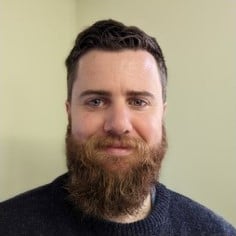Great work! Dr Olsi Kusta graduates from CRADLE
23 February 2024
Dr Olsi Kusta has completed his PhD journey with CRADLE and the University of Copenhagen

Olsi’s thesis title is Digitization of Pathology: Exploring the implications of digital technologies in routine work, research, and medical education. Olsi was supervised by Professor Klaus Lindgaard Høyer, University of Copenhagen, and CRADLE’s Professor Margaret Bearman.
Olsi’s co-supervisors were Professor John Brandt Brodersen, University of Copenhagen, Associate Professor Torsten Risør, University of Copenhagen, and Associated Professor Radhika Gorur, Deakin University.
Olsi graduated in December 2023 and is now teaching as a guest lecturer in several courses at the University of Copenhagen. Currently, he is teaching global health challenges at the Council on International Educational Exchange (CIEE), Copenhagen. Olsi is continuing to research, with a focus on of social science, technological innovation, and medical diagnostics.
We asked Olsi to describe the focus of his thesis and provide some reflections and highlights of his study experience.
What was the aim of your research?
My PhD project explores the shift to digital pathology in the medical specialty of pathology, which provides diagnostic services, particularly for cancer patients. The main routine work in pathology involves preparing human tissue samples as glass slides, which are traditionally viewed under a microscope. Digital pathology shifts laboratory work from the microscope to the computer screen.

My article-based thesis examines digital pathology in three practices associated with pathology: evaluating research assessing diagnostic performance, examining policy promises viewed through routine work in Denmark, and using the virtual microscope in medical education.
My research uses Science and Technology Studies (STS) and Evidence-Based Medicine (EBM) as theoretical resources. The first paper evaluates the performance of digital pathology for diagnostic purposes compared to the light microscope in validation studies of pathology. The second paper juxtaposes the political promise of digitization with everyday practices from two pathology departments in Denmark. The third paper explores the complexity of the virtual microscope for pathology education.
My thesis suggests that implementing and using digital pathology in primary diagnosis or the virtual microscope in pathology education is not unproblematic but requires attention to tensions and uncertainties across research, routine work, and education.
Publications
- Kusta, O., Rift, C. V., Risør, T., Santoni-Rugiu, E., Brodersen, J. B. (2022). Lost in digitization – A systematic review about the diagnostic test accuracy of digital pathology solutions. Journal of Pathology Informatics, 13, 100136. https://doi.org/10.1016/j.jpi.2022.100136.
- Kusta, O., Bearman, M., Gorur, R., Risør, T., Brodersen, J. B., & Hoeyer, K. (2024). Speed, accuracy, and efficiency: The promises and practices of digitization in pathology. Social Science & Medicine, 345, 116650. https://doi.org/10.1016/j.socscimed.2024.116650
Any highlights from your PhD journey?
This PhD program has been a joint collaboration between the University of Copenhagen and Deakin University. This project gave me the opportunity to collaborate with departments of pathology in Denmark. This, besides facilitating the conduct of fieldwork in two hospitals during the pandemic, enabled me to collaborate with two pathologists when writing a systematic review about digital pathology. This review helped to engage in interdisciplinary debates about evidence-based medicine, diagnostic reasoning, and the performance of digital pathology. By emphasizing the need to introduce the concept of over-diagnosis when assessing this technology, a product of these debates, we were invited to further elaborate on this view in the Pathology News outlet.
On this academic journey, I had the chance to spend a great research stay at CRADLE. This journey has helped me immensely to foster new connections and gain more knowledge about the social sciences, medicine, and education. I have been involved in teaching several classes, from medical ethics to medical science and technology studies to scientific theory and practice. During this journey, I have participated in two conferences: the IPOQ conference in Oslo on digital technologies in medicine (2020) and the EASST conference in Madrid (2022).
Where to from here?
After submitting the PhD thesis, I have been teaching as a guest lecturer in several courses at the University of Copenhagen. Currently, I am teaching global health challenges at the Council on International Educational Exchange (CIEE), Copenhagen. Besides teaching, at the same time, I am writing a research proposal about the use of artificial intelligence (AI) in diagnostic services. With this proposal, I intend to apply for funds to conduct research in diverse diagnostic specialties such as pathology, radiology, and dermatology.
My aim is to continue the academic journey as a postdoctoral researcher in the fields of social science, technological innovation, and medical diagnostics. Through a continuing academic journey, I hope to further contribute to knowing more about how digital and AI innovation affect the everyday work of medical practitioners, as well as the potential implications for healthcare systems and patients.












